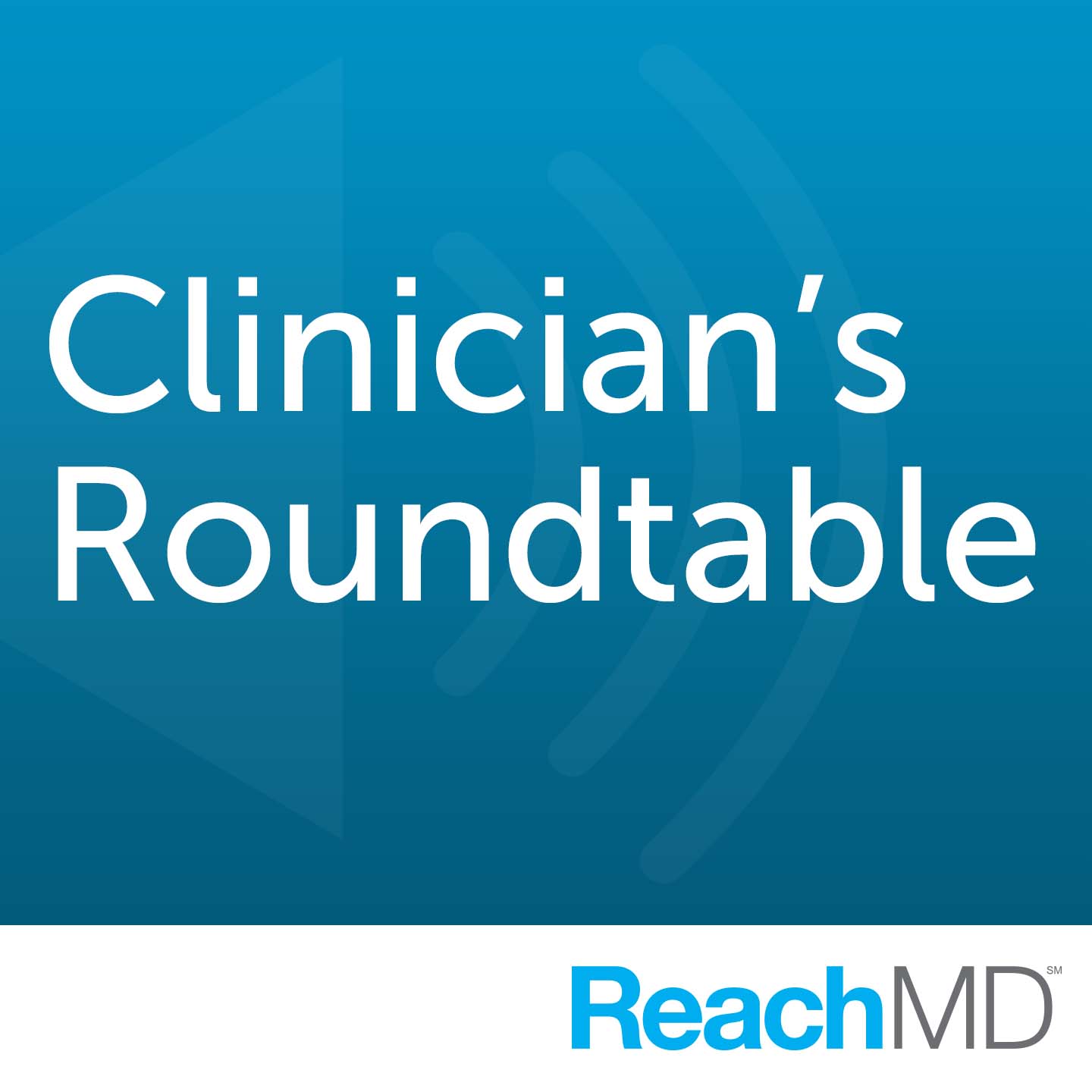

Clinician's Roundtable
ReachMD
Tune in to interviews with the top thought leaders in medicine exploring the clinical and professional issues that are foremost in the minds of the medical community. Join us at the Clinician's Roundtable for discussions on a vast range of topics that every medical professional should know about.
Episodes
Mentioned books

Jul 15, 2008 • 0sec
Patients and Doctors Benefit When the Physician and Administrator Become a Team
Host: Bruce Japsen
Guest: William Jessee, MD
Should doctors also be running their own practices? Dr. William Jessee, president and chief executive officer of the Medical Group Management Association, tells Bruce Japsen about how a team approach between doctor and administrator may be in order to improve the patients' experience, boost doctor revenue and help foster more consumer-friendly medicine.

Jul 15, 2008 • 0sec
Physician Incomes Outpaced by Inflation
Host: Bruce Japsen
Guest: William Jessee, MD
The squeeze of reimbursement from private payers and Medicare cuts to doctors are conspiring to take a substantial toll on physician incomes, which in many cases, are not keeping up with inflation. Dr. William Jessee, president and chief executive officer of the Medical Group Management Association (MGMA), details trends in physician practice incomes, as documented in a survey conducted by the MGMA. Bruce Japsen hosts.

Jul 15, 2008 • 0sec
How to Deal With the Crushing Administrative Burdens of Your Practice
Host: Bruce Japsen
Guest: William Jessee, MD
Administrative burdens and an overload of paperwork have a cumulative effect on a medical group practice. How is a doctor supposed to deal with this so it does not effect patient care? Dr. William Jessee, president and chief executive officer of the Medical Group Management Association, tells Bruce Japsen about new and innovative ways MGMA advises doctors to deal with the ever-changing rigors of practicing in a group setting.

Jul 14, 2008 • 0sec
Hepatic Resection and Transplantation
Host: Mark Nolan Hill, MD
Guest: Alan Hemming, MD
As we extend the bounds of surgical resection for hepatic malignancies, we overcome previously held limitations of our efforts against liver disease. How do our techniques and theories on hepatic resection also relate back to hepatic transplantation? Are we developing more effective strategies to protect the liver during surgery? Dr. Alan Hemming, professor of surgery and chief of transplantation and hepatobiliary surgery at the University of Florida College of Medicine, also peers into the future to examine the potential role of laparoscopy or endoscopy in hepatic surgery. Dr. Mark Nolan Hill hosts.

Jul 14, 2008 • 0sec
New Techniques for Extended Hepatic Resection
Host: Mark Nolan Hill, MD
Guest: Alan Hemming, MD
In recent years, extensive debate has centered around the possibility of further extending the scope of hepatic resection. With research now demonstrating the potential value of extended resection, will more patients be offered this as a treatment option? Are there common complications to consider when evaluating a candidate for this surgery? Dr. Alan Hemming, professor of surgery and chief of transplantation and hepatobiliary surgery at the University of Florida College of Medicine, explains the next steps toward entrenching extended resection in our arsenal of treatment for hepatic disease. Dr. Mark Nolan Hill hosts.

Jul 14, 2008 • 0sec
A More Aggressive Approach to Hepatic Resection
Host: Mark Nolan Hill, MD
Guest: Alan Hemming, MD
For patients with severe hepatic malignancy, attempts to cure their illness are rarely, if ever, successful. We're learning, however, that a more aggressive surgical approach may extend survival rates well beyond those of our previous techniques. Dr. Alan Hemming, professor of surgery and chief of transplantation and hepatobiliary surgery at the University of Florida College of Medicine, details his pursuit of novel measures to surgically address severe hepatic malignancies with host Dr. Mark Nolan Hill.

Jul 14, 2008 • 0sec
Antidepressants: The Lay of the Land
Host: Leslie P. Lundt, MD
Guest: Stephen Stahl, MD
Regardless of your specialty, Prozac, Zoloft and Paxil have become commonly used and familiar medications. What other medications should we know? Dr. Stephen Stahl, adjunct professor of psychiatry at the University of California at San Diego joins host Dr. Leslie Lundt to tell us what we need to know about antidepressants.

Jul 14, 2008 • 0sec
How to Monitor and Manage Patients on Antipsychotics
Host: Leslie P. Lundt, MD
Guest: Stephen Stahl, MD
Last year antipsychotics were one of the more widely sold drugs in the United States. What do we need to know about these medications? Should non-psychiatrists be prescribing them routinely? Dr. Stephen Stahl, internationally recognized clinician, researcher and teacher in psychopharmacology and the author of more than 350 articles and chapters, joins host Dr. Leslie Lundt to talk about the prescribing and use of antipsychotics.

Jul 14, 2008 • 0sec
The Latest in Psychopharmacology
Host: Leslie P. Lundt, MD
Guest: Stephen Stahl, MD
In 2000, Dr. Stephen Stahl published what many of us consider to be the definitive text of psychopharmacology. The wait for the third edition is finally over. What has happened in the last 8 years? Dr. Stahl joins host Dr. Leslie Lundt in this informative interview.

Jul 14, 2008 • 0sec
The History of Female Sexual Dysfunction
Host: Leslie P. Lundt, MD
Guest: Mary Roach
"Bonk: The Curious Coupling of Science and Sex" was written by Mary Roach and follows the winding history of science and its exploration of human sexuality, going back as far as Aristotle and finally ending with recent discoveries about the origination and anatomy of the female orgasm. In this discussion with host Dr. Leslie Lundt, Roach focuses on female sexual dysfunction, the historical precedents leading to this diagnosis, and the science behind antiquated to modern treatment methods.


